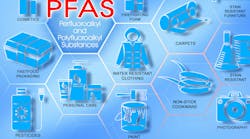WALKERTON, ON Canada, Dec. 6, 2000— Health officials have lifted a boil water order in a small Canadian town, declaring the water source to be free from E. coli contamination, which killed seven people and sickened 2,300 earlier this year.
Dr. Murray McQuigge, Medical Officer of Health for the Bruce-Grey- Owen Sound Health Unit, lifted the Boil Water Advisory in the community 90 miles west of Toronto today at a public meeting.
Since the outbreak in May, residents of Walkerton have been boiling the water, drinking bottled water and in some cases, treating their own tap water with bleach.
After an outbreak was reported health officials discovered the presence of the deadly strain of bacteria in one of the town's wells. Officials determined later that heavy rain had washed cattle manure into the well and a faulty chlorination system had allowed the pathogen to pass through the system to residents' taps.
Dr. McQuigge issued a boil order for the town's water on May 21, and tests two days later confirmed the presence of E. coli. By May 25, five people had died and hundreds were sick. Eventually, the outbreak killed seven people in all, causing an outcry from the residents for safer treatment methods.
The manager of the water utility, Stan Koebel, was scheduled to testify but instead will have a psychiatric evaluation to determine his fitness as a witness. An Associated Press report said Koebel knew about the contamination May 18 but did not report it to the community.
Two separate investigations were conducted, one by the Ministry of the Environment and one by the Bruce-Grey-Owen Sound Health Unit with assistance from Federal Health Canada epidemiologists.
Working closely with the Municipality of Brockton, the Ministry of the Environment, and the Ontario Clean Water Agency, the Public Health Unit's panel of water experts developed a list of questions that would have to be answered prior to lifting the Boil Water Advisory.
The panel then examined the Ministry of the Environment's Technical Report on the Status of the Walkerton Water Supply System, November 2000. (The report examines actions that were taken to restore and secure Walkerton's water supply. It discusses Walkerton's new filtration treatment system, a system that will filter out E. coli and E. coli 0157:H7 as well as Cryptosporidium. The report also details how the filtration plant, a 15-minute contact tank for chlorine and the multiple alarms for turbidity, particles and chlorine ensure a safe water supply.)
Discussions followed with the Ministry of the Environment during which all aspects of their report were discussed.
The Public Health Unit then conducted its own water tests. The water was tested at 30 different sites. A total of 40 samples were collected each time. These tests were repeated 24 hours later. The tests yielded no adverse samples.
Based on the Ministry of the Environment's report, remedial work, monitoring and testing, and the Public Health Unit's independent investigation and testing, the Public Health Unit made a recommendation to lift the Boil Water Advisory. This recommendation was supported by the Chief Medical Officer of Health for Ontario.
Medical Officer of Health Dr. Murray McQuigge stated, "In order to prevent contamination of water systems the emphasis must be on the following:
1. Wells to be used for drinking water systems must be properly drilled, with the appropriate hydrogeological, bacteriological and chemical investigations conducted prior to the wells being put into production.
2. The area around a well must be secured to ensure there is no potential for environmental pollution of that well.
3. Wells or surface water drinking supplies must have the best treatment possible to ensure that the public consuming the water is not put at risk.
Adequate training and a system of checks and balances are required to reduce human error. Training should ensure that new developments and new risks are understood, anticipated and acted upon. An accountability system must be designed, standards established, and manuals created to reduce the possibility of mistakes."
The Ontario Clean Water Agency has invested $7 million to repair the water system and install a new filtration plant, according to the AP report.


